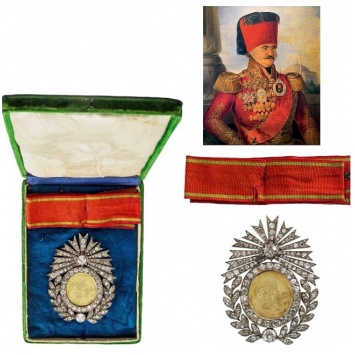Round Medallion, 82 x 64 mm., GOLD, embossed with the imperial Tughra of Sultan Abdülmecid I (1825–1861) and a branch with blossoms and flowers, enclosed in an outer circlet in silver, completely set with Diamonds, above a large, cut diamond, from which radiate 13 beams in silver, profusely set with diamonds of different sizes, below, around the medallion a laurel wreath in silver, also set with diamonds, tied by a larger, diamond, the reverse, showing the excellent quality of the construction of the piece, with a length of original ribbon.
An outstanding and as said, unique, in the Special Class as awarded by the Sultan as a sign of exceptional, personal grace, in this case we are in the period when the Ottoman Empire’s honour system was going through the reform that led to the creation of a modern, European-inspired series of orders and decorations, excellent condition.
note: Miloš Obrenovic “the Great” (1780 or 1783 – September 26th, 1860) can be considered the father of Serbia as a country, by fighting in both the two so-called Serbian Uprisings against the Ottoman Empire in 1813 and 1815. The second uprising, in coincidence to the definitive fall of Napoleon and the defeat of the Ottomans, led to a treatise that although keeping Serbia as an Ottoman principality, granted a certain autonomy, with Miloš Obrenovic as its ruler. He was a mano of rather simple ediucation, but brave in combat and intelligent in the government, besides turmoils and attempts to his life. He tried to adopt the “Code Napoléon”, but had to face the pressure of his neighbours, Austria and the Russian Empire. He preferred to remain within the Ottoman Empire, but accepting the protection of Russia, especially because of the Christian Orthodox population of the country under his rule. He sustained the development of trade and agriculture, all in the attempt to modernize Serbia. At a certain point, he wanted strict bounds with Austria too, where he was often as guest at the Imperial court, properly treated as a ruling King. He also promoted arts and sciences, trying also to create a system of schools inspired to Europe. I RR!


